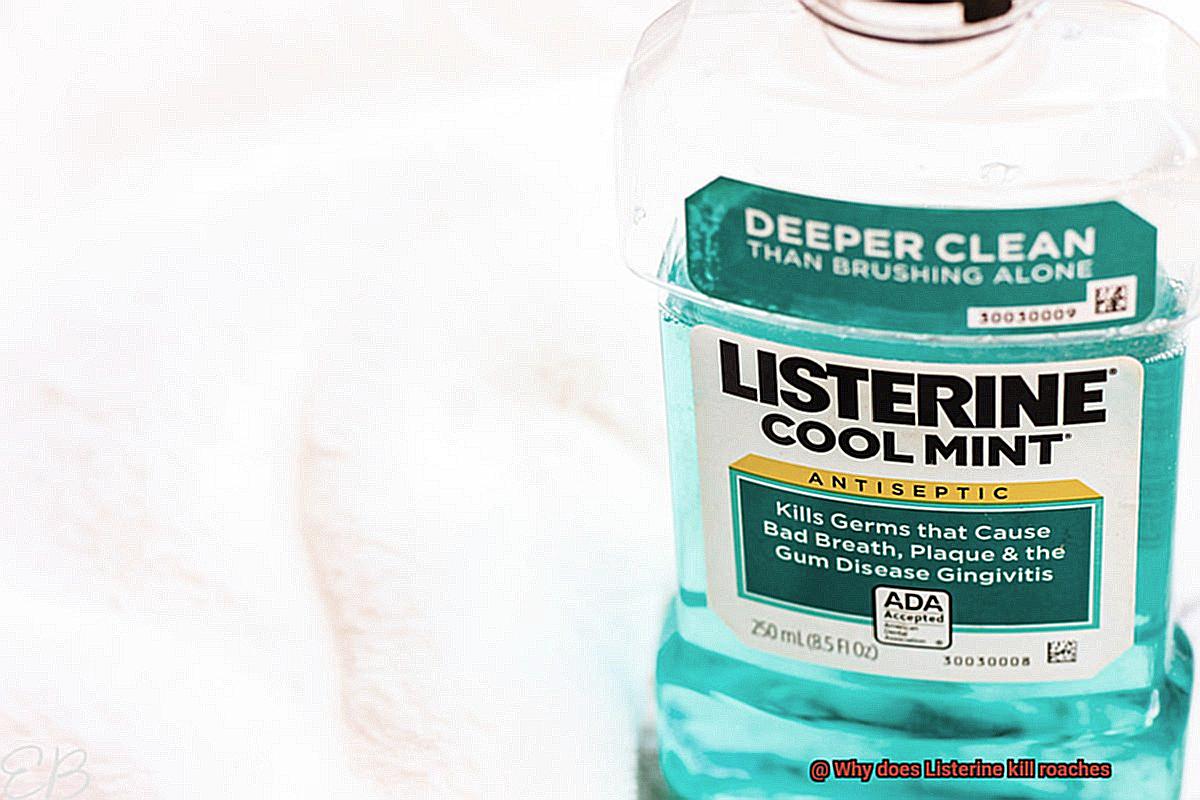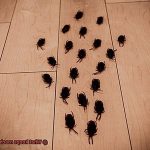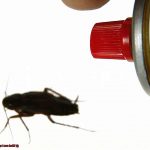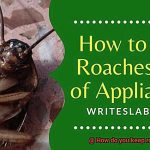Cockroaches. Just the thought of them is enough to make your skin crawl. These pesky insects are notoriously difficult to get rid of and can quickly turn a happy home into a nightmare. Luckily, there are many ways to exterminate these creepy-crawlies. One surprising method that has gained popularity in recent years is the use of Listerine mouthwash.
Yes, you read that right – the same mouthwash that you use to freshen your breath can also be used to kill cockroaches. But how does it work? The secret lies in eucalyptol, a natural insecticide found in Listerine’s formula. This powerful compound disrupts the nervous system in insects and causes them to die.
But wait, there’s more. Listerine also contains menthol and thymol, two compounds that act as potent deterrents for cockroaches. These toxic substances cause roaches to avoid areas that have been treated with Listerine, making it an effective preventative measure against future infestations.

So why waste your hard-earned money on expensive pesticides when a simple bottle of Listerine can do the trick? Not only is it an affordable and easy-to-find solution, but it’s also a safer and more natural alternative to harsh chemicals. In this blog post, we’ll delve into the science behind how Listerine kills roaches and provide you with some tips on how to use it effectively so you can keep your home pest-free once and for all.
What is Listerine?
Contents
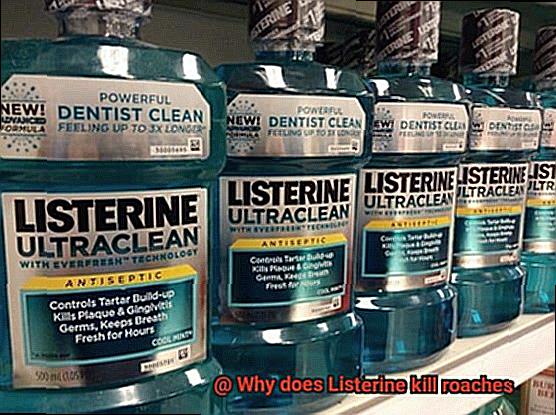
Let’s dive into the ingredients of Listerine and discover how it can be an effective pest control solution.
Listerine was first introduced in the late 1800s as a surgical antiseptic, but it wasn’t until the 1920s that it became renowned as a mouthwash. The original formula contained a potent blend of active ingredients such as eucalyptol, menthol, thymol, and methyl salicylate. These ingredients were chosen for their germ-killing properties and refreshing scent.
Today, Listerine is available in various flavors and formulations designed to cater to different needs. However, what makes Listerine an excellent roach killer is its essential oils-rich composition. Eucalyptol, thymol, and menthol are all well-known insecticides that attack the respiratory system of pests upon contact. When roaches come into contact with Listerine, these oils interfere with their respiratory system and ultimately cause them to suffocate and die.
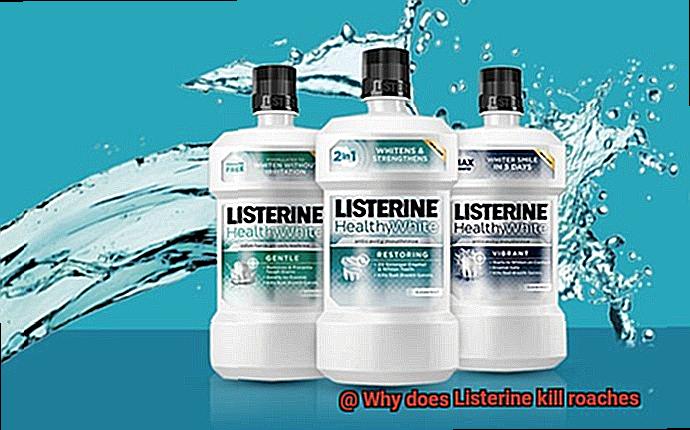
Alcohol is another ingredient in Listerine that proves toxic to roaches. It acts as a desiccant, dehydrating the roach’s body and causing it to die from lack of water. Additionally, Listerine’s strong scent can disorient pests by masking their natural pheromones and making it difficult for them to navigate and survive.
While Listerine can be effective against roaches, it’s important to note that it may not work in all situations or on all types of roaches. Some pests may be resistant to the essential oils or alcohol in Listerine and require a different type of insecticide or extermination method.
In conclusion, Listerine is primarily a mouthwash that also offers an effective solution for roach control. Its essential oils, alcohol content, and strong odor make it a potent pest deterrent. However, it’s crucial to remember that Listerine is not a registered insecticide and should not be relied upon as the sole means of controlling a roach infestation. It’s always best to consult with a pest control professional for the most effective and safe methods of controlling roaches in your home or business.
What are the Ingredients in Listerine?
Listerine has been a trusted mouthwash for over a century, with its unique and potent taste coming from a combination of four key ingredients: alcohol, eucalyptol, menthol, and thymol. Let’s delve deeper into each ingredient and discover the powerful properties they bring to the table.
Firstly, alcohol is the primary ingredient in Listerine, serving as a solvent for the other ingredients while also boasting antiseptic properties that can kill bacteria in the mouth. It’s no wonder alcohol is often used in hand sanitizers.
Next up is eucalyptol, which is derived from the eucalyptus tree. It packs a punch with its anti-inflammatory properties and can soothe sore throats. Moreover, it has antiseptic properties that can help decrease inflammation and eliminate bacteria.
Menthol, found in peppermint oil, gives Listerine its cooling effect on the skin and mucous membranes. Not only that, but it also has analgesic properties that can alleviate pain.
Finally, thymol is an essential oil with antiseptic properties frequently used in oral care products like mouthwash to eradicate germs and bacteria.
These four ingredients work together synergistically to create an antiseptic solution that efficiently kills germs and bacteria in the mouth, promoting excellent oral hygiene. However, it’s essential to note that Listerine is not intended to kill insects like roaches. While it may be effective at eliminating some insects on contact, it is not a long-term pest control solution.
How Does Listerine Kill Roaches?
Look no further than your bathroom cabinet. Listerine, the popular mouthwash, has been found to be an effective natural remedy for roach control. But how exactly does it work?
The answer lies in Listerine’s active ingredients: menthol, thymol, and eucalyptol. These three natural insecticides disrupt the nervous system of roaches when they come into contact with them. Menthol, commonly found in mint plants, acts as a repellent that disrupts insects’ olfactory systems. Thymol, extracted from thyme plants, is effective against a wide range of insects, including mosquitoes and ants. Eucalyptol, commonly used in commercial insecticides and natural remedies, also has insecticidal properties.
When roaches come into contact with Listerine, these three ingredients interfere with their neurotransmitters, leading to paralysis and eventual death. But that’s not all – Listerine also contains alcohol, which helps dissolve the waxy layer on the surface of the roach’s exoskeleton. This makes it easier for the active ingredients to penetrate the insect’s body and cause damage to its internal organs.
While Listerine is a great quick fix for killing roaches on contact, it’s important to remember that it’s not a long-term solution for controlling an infestation. To effectively get rid of roaches, you need to address the root cause of the problem by eliminating their food sources and hiding places. Regular cleaning and proper storage of food can go a long way in preventing roaches from taking over your home.
Does Listerine Work on All Types of Roaches?
Roaches are unwelcome guests in any home, and many people have heard that Listerine is a natural and effective way to get rid of them. While it’s true that Listerine can be effective in killing roaches, it’s important to understand that its effectiveness may vary depending on the type of roach.
Listerine contains powerful insecticides such as eucalyptol, thymol, and methyl salicylate, which are known to disrupt the nervous system of insects, including roaches. However, this may work better on smaller species like German cockroaches than on larger and tougher types like American cockroaches.
It’s also important to note that even if Listerine does work on a particular type of roach, it may only offer a temporary solution. Roaches have a remarkable ability to adapt to different environments and develop resistance to insecticides over time.
So, what should you do if you have a roach infestation? First, identify the root cause of the problem. Seal off any entry points and eliminate food sources that may be attracting them. Then, use Listerine or other insecticides as a complementary method to fully eliminate the infestation.
Is Listerine Safe to Use Around Humans and Pets?
While Listerine may seem like a convenient solution, it’s important to understand the potential risks when using it around humans and pets.
While Listerine is generally considered safe for use in small quantities, it’s important to note that it’s not intended for use as a pesticide. The active ingredients in Listerine, including thymol and eucalyptol, are commonly found in household cleaning products and recognized as safe by the Environmental Protection Agency (EPA). However, Listerine has not been specifically tested for its effects on roaches, so its long-term effectiveness may vary.
It’s essential to take proper precautions when using any type of insecticide, including Listerine. Keep it out of reach of children and pets, and avoid spraying it directly on them. Additionally, use Listerine in a well-ventilated area and strictly follow the manufacturer’s instructions.
If you’re concerned about using Listerine around your home, there are other natural pest control methods you can try. Diatomaceous earth is a popular option that kills roaches by drying out their exoskeletons. Alternatively, boric acid is another natural pesticide that can be effective against roaches.
Alternatives to Using Listerine to Kill Roaches
Fear not, there are several alternatives to using Listerine that are just as effective, and even safer to use around humans and pets.
One popular alternative is boric acid. This natural insecticide works by dehydrating the insects and disrupting their nervous system. It’s commonly used to kill ants, termites, and cockroaches, making it a reliable choice for many homeowners.
Diatomaceous earth is another alternative to Listerine, made from fossilized algae. This fine powder penetrates the exoskeleton of insects, causing them to dehydrate and die. Not only is it effective, but it’s also safe for humans and pets, making it a preferred choice for those who want to avoid harsh chemicals.
Essential oils such as peppermint, eucalyptus, and lavender have natural insecticidal properties that can repel and kill cockroaches. Simply mix with water and spray in areas where cockroaches are present for an easy and natural solution.
If DIY methods don’t do the trick, consider hiring a professional pest control service. These experts have access to powerful chemicals and equipment that can quickly and effectively eliminate cockroach infestations. While it may be more expensive than DIY options, the peace of mind knowing that cockroaches are completely eliminated from your home or business is invaluable.
CKRyDwkVaCs” >
Conclusion
In conclusion, Listerine mouthwash is a budget-friendly and potent remedy for eradicating and deterring cockroaches from your household. The deadly combination of essential oils, including eucalyptol, menthol, and thymol, wreaks havoc on the nervous system of roaches upon contact. As a result, it causes paralysis and eventually leads to their untimely demise. Moreover, Listerine’s pungent aroma serves as an effective repellent that keeps these pesky critters at bay.
It’s crucial to keep in mind that Listerine isn’t a registered insecticide and may not be effective against all types of roaches or in every situation. Additionally, it must be used with caution around humans and pets since it isn’t designed for use as a pesticide.
If you’re seeking alternative remedies to Listerine for controlling roaches, consider natural options like boric acid or diatomaceous earth. Essential oils such as peppermint and lavender can also work wonders in repelling cockroaches.
Ultimately, the key to successfully managing a roach infestation is identifying its root cause and taking preventive measures like proper food storage and regular cleaning.

